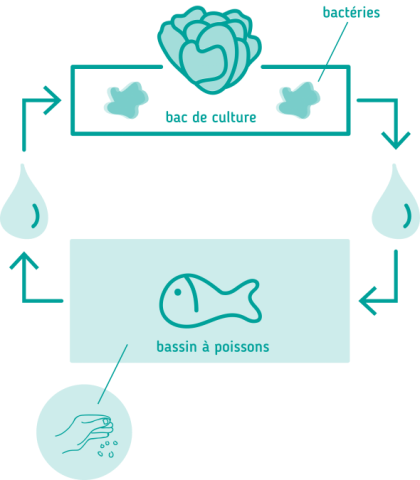How the LHC is inspiring a Smart Urban Farm Startup

“Data is the new petrol,” says Axel Voitier, a CERN robotics engineer who has worked for nearly a decade on the industrial control systems on the Large Hadron Collider (LHC). After his experience at CERN, Axel has decided to transition into the world of entrepreneurship. After a decade of experience of data coming from the control systems of the largest experiment in the world, he will be focusing on the data to help manage “smart urban farms”. He is currently setting up a company dedicated to this new type of farming, an internet-of-things approach where control systems are used to manage urban farms automatically.
In preparation for his startup, he is currently part of an urban farm collective called Exodes Urbains, which already has an aquaponics set-up behind the Geneva central station in Switzerland, a few kilometres from CERN. Aquaponics is an agricultural system where the waste produced by farmed fish provides the nutrients required for the culture of plants.
The control system aspect of it is built on free and open source software, in line with CERN’s tradition of openness. This means that other developers can use and change the software and are encouraged to make their improvements freely available as well. The open source side also provides transparency which resonates with potential clients. “Open source does not mean insecure data – security is a central part of this project.”
After over a decade at CERN, Axel was interested in a new challenge and change. “I am interested in having a direct impact on the final users, which is why I am so excited about starting this company,” explains Axel. “This is why the security aspect is vital, because even though it relies on an abundance of data, the project must be user-centric – not data-centric - to be successful.” He says the progression from robotics engineer to entrepreneur builds on the knowledge he acquired while working at CERN, both for the technological and business aspects.
On the business side, Axel had been toying with the idea of starting his own company for a while. He was hesitant at first, as he had heard of others who had failed, and wanted to put all the chances on his side. Then he heard of the new entrepreneurship meet-ups that the CERN Knowledge Transfer group was setting up. The first one was held in 2015, and Axel grabbed the opportunity to find out more about entrepreneurship and how CERN could help him see his dream come true. “I felt my professional project was supported by CERN. It was the information from the meet-ups that convinced me to make the jump. In fact, I met the urban farm collective at one of the EM-Us.”
The entrepreneurship meet-ups (or EM-Us for the initiated) are open to all those who are interested in learning more about entrepreneurship, with or without a particular project in mind. Another EM-U enthusiast, Giovanni Porcellana, works in the Knowledge Transfer group at CERN and is also a nuclear engineer, entrepreneur and active member of the World Economic Forum’s Global Shapers Community. “The meet-ups are about connecting with the community, within CERN, but also beyond,” he says. “Anyone can show up; you don’t have to be a seasoned entrepreneur!”
Each meeting has an overarching topic, sometimes introduced by external guest speakers. Past speakers have included experts from incubation centres, business schools as well as entrepreneurs. The meetings are focused on exchanging around the given day’s theme.
What advice does Axel have for wannabe entrepreneurs? “Do your homework,” he advises. “Technological knowledge is not enough, and you should bounce your ideas off experienced entrepreneurs.” He adds that the entrepreneurship meet-ups were central to both his motivation, and his understanding of his own project. And once the homework is done? Axel summarises his own adventure: “Don’t be afraid of the mountain.”
A shorter version of this article is also published in the CERN Bulletin.
The CERN Knowledge Transfer group organises Entrepreneurship Meet-Ups (EM-Us) every other week at CERN.
For more information and to sign up to the mailing list, read more here.
- Log in to post comments
